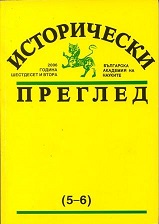Свободата във Византия като политически идеал (ХII-ХV век)
Three Kinds of Liberty as Political Ideals in Byzantium, Twelfth to Fifteenth Centuries
Author(s): Dimitâr AngelovSubject(s): History
Published by: Институт за исторически изследвания - Българска академия на науките
Summary/Abstract: This discussion has demonstrated that liberty represented more than one political ideal in Byzantium between the twelfth and the fifteenth century. Different and discordant voices created their own credos, including freedom against oppressive foreign rule, freedom as rights, and freedom of the church. These three kinds of liberty had different intellectual origins. Liberty in the face of aggression harks back to a classical Greek ideal, whereas liberty as rights and liberty of the church derive from Byzantine ideas and institutions. The three ideals build on traditional understandings of the word liberty, occasionally entering into dialogue with these understandings or indeed among themselves. In particular, Byzantine authors imaginatively combined the economic idea of liberty with those of liberty as freedom from tyranny and as independence from foreign rule. Similarities in the interpretation of liberty in Byzantium and in kindred ancient and medieval cultures are obvious. Further systematic research in comparative historical semantics may be able to yield illuminating conclusions. The three political ideals were an uneasy fit. Liberty against foreign rule was the one ideal of freedom that radiated from court circles during critical historical periods of warfare against the Latins and the Ottomans. Classically educated authors also seized on this ideal when arguing against policies and actions that could lead to submission to Ottoman rule. By contrast, the other two ideals of liberty–liberty as rights and liberty of the church–were pitted against claims raised by imperial authority. The notion of liberty as collective and individual rights opposed the economic claims of the central government. Liberty of the church posed a challenge to the imperial management of church affairs. In the fourteenth and the fifteenth centuries, the slogan of liberty was as much directed against the authority of Constantinople and the emperor as it was articulated at the court with a sense pertaining to the entire political community. The three ideals of liberty open a side chapter in the history of Byzantine political and social thought. Unlike philanthropy, generosity, and equality, liberty was never a common imperial virtue in kingship literature or an idea describing operational aspects of government. From this point of view, it may be considered to be of marginal importance. Yet this ever-alluring concept was not without a historical significance. Particularly illuminating is the way it served to further the agendas of individuals, urban communities, and the church as a corporate body. This political approach to liberty bears witness once again to the diverse challenges raised by centrifugal forces and dissident voices in the later centuries of Byzantine history.
Journal: Исторически преглед
- Issue Year: 2011
- Issue No: 5-6
- Page Range: 39-61
- Page Count: 23
- Language: Bulgarian
- Content File-PDF

